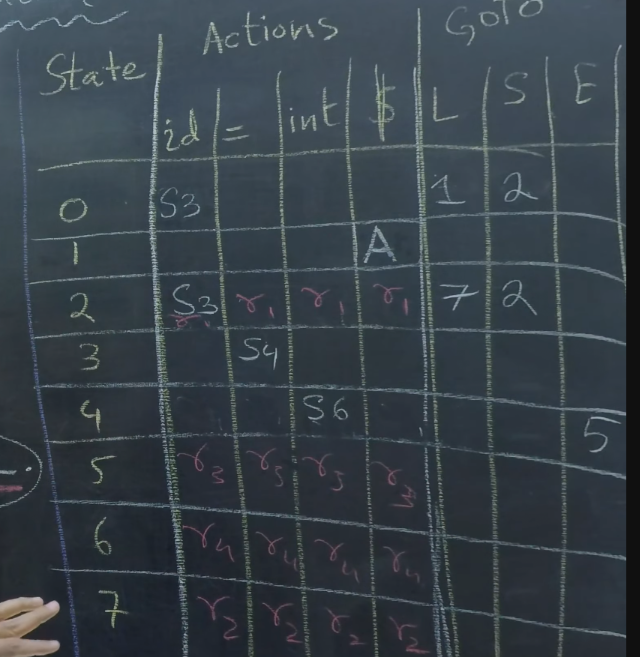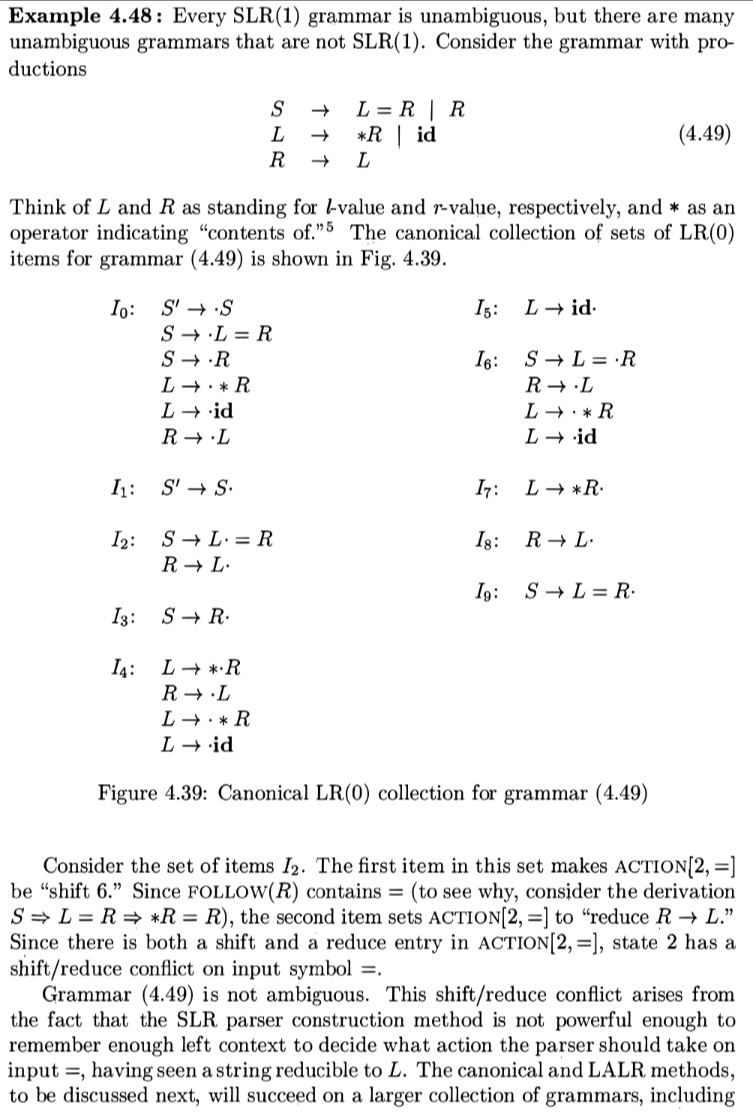- Top-Down
- eliminating left recursion
- left factoring
- recursive descent
- computing first and follow
- LL(1)
- Bottom-Up
- Shift-reduce method
- LR(0)
- SLR
- CLR
- LALR
Top Down Parsing
Eliminating Left Recursion
replace
E : E + T | T
with
E : TE'
E' : +TE' | eps
Left Factoring
replace
S : if (expr) S else S
| if (expr) S
| other
with (take common part out)
S : if (expr) S S'
| other
S' : else S
| eps
Recursive Descent
import re
def tokenize(expression):
"""
look for numbers or brackets or operators
"""
token_pattern = r"(\d+|[()\^+\-*/])"
tokens = re.findall(token_pattern, expression)
return tokens
# parse functions for each non terminal
def parse_factor(tokens):
"""
F -> (E) | number
"""
token = tokens.pop(0)
if token == "(":
result = parse_expression(tokens)
# HACK: prolly should check below statement
tokens.pop(0) # get rid of )
return result
else:
return float(token)
def parse_exponent(tokens):
"""
X -> F ^ X | F
"""
left = parse_factor(tokens)
while tokens and tokens[0] == "^":
op = tokens.pop(0)
right = parse_exponent(tokens)
if op == "^":
left **= right
return left
def parse_term(tokens):
"""
T -> X*T | X/T | X
"""
left = parse_exponent(tokens)
while tokens and tokens[0] in "*/":
op = tokens.pop(0)
right = parse_exponent(tokens)
# NOTE: backtracking happening here
# to eliminate start predicting shit (LL(1))
if op == "*":
left *= right
else:
left /= right
return left
def parse_expression(tokens):
"""
E -> T + E | T - E | T
"""
left = parse_term(tokens)
while tokens and tokens[0] in "+-":
op = tokens.pop(0)
right = parse_term(tokens)
if op == "+":
left += right
else:
left -= right
return left
def evaluate_expression(expression):
tokens = tokenize(expression)
result = parse_expression(tokens)
return result
expr = "init"
while expr:
try:
print("parser: ", end='')
expr = input()
print(evaluate_expression(expr))
except EOFError:
print()
print("parser: exiting")
breakFirst and Follow sets
First :
"""
A := BC
"""
if eps not in first(B):
first(A) = first(B)
else if eps in first(B):
first(A) = (first(B) - {eps}) U (first(C))Follow:
"""
A := BC
"""
follow(C) = follow(A)
if eps not in follow(C):
follow(B) = first(C)
else if eps in follow(C):
follow(B) = (first(C) - {eps}) U (follow(A))-
compute first sets first
- go from bottom level production to top
-
then compute follow set
- go from top to bottom but might require multiple scans
-
examples: https://www.gatevidyalay.com/first-and-follow-compiler-design/
-
theory: https://cap.ecn.purdue.edu/compilers/lectures/Week3/lecture-3.3.pdf
LL(1) Grammars
- left to right leftmost derivation with 1 lookahead token
- A grammar is LL(1) iff whenever
A → α | βare two distinct productions, the following three conditions hold:- For no terminal
ado both α and β derive strings beginning witha. - At most one of α and β can derive the empty string.
- If β derives the empty string, then α does not derive any string beginning with a terminal in FOLLOW(
A).
Likewise, if α derives the empty string, then β does not derive any string beginning with a terminal in FOLLOW(A).
- For no terminal
for each production "A -> a":
for each terminal "a" in first("A"):
M["A"]["a"] = "A -> a"
if eps in first("A"):
for each "b" in follow("A"):
M["A"]["b"] = "A -> eps"example 1
S : +SS
| *SS
| a
\text{FOLLOW(S)} = \set{+, *, a, \}$
| Non terminal | a | + | * | $ |
|---|---|---|---|---|
| S | S → a | S → +SS | S → *SS |
example 2
S : (S)S
| eps
\text{FOLLOW(S)} = \set{\rparen, \}$
| ( | ) | $ | |
|---|---|---|---|
| S | S → (S)S | S → | S → |
- theory:
- practice:
Bottom Up Parsing
Shift-Reduce Method
- Shift: shift the next input symbol onto the top of the stack
- Reduce: the right end of the string to be reduced must be on the top of the stack. Locate the left end on the stack and replace with appropriate non-terminal
- Accept: announce successful completion of parsing
| stack | input | action |
|---|---|---|
| $ | a * a $ | shift |
| $ a | * a $ | reduce F → a |
| $ F | * a $ | reduce T → F |
| $ T | * a $ | shift |
| $ T * | a $ | shift |
| $ T * a | $ | reduce F → a |
| $ T * F | $ | reduce T → T * F |
| $ T | $ | reduce E → T |
| $ E | $ | accept |
- Bottom of stack always has $
- End of input always has $
CAUTION
not good with ambiguous grammars
- if you have time and want some more intuition on the automaton: https://blog.jeffsmits.net/lr-parsing-recursive-ascent/
LR Parsers (LR(0))
-
automaton: https://www.youtube.com/watch?v=BxMFn7aelBk
-
Items: productions that keep track of how much has been consumed
-
Closure: Include every possible production from a main production
-
Augmented Grammar: extra state to add an accept
LR(0) parsers
parsers don’t lookahead, so you reduce on every input token for a state

Simple LR Parsers
Now you are looking ahead one token. So you will only reduce when you encounter symbols in the follow set of the required non-terminal, instead of filling up every cell.
CLR Parsers
Example of LR(1) parser. So you make LR(1) automaton which includes a lookahead token derived from the first/follow sets
- peak: https://youtu.be/sh_X56otRdU?si=JH0TW6yPzWRzowZ3
- slightest touch of theory: https://cs.nyu.edu/~gottlieb/courses/2000s/2006-07-fall/compilers/lectures/lecture-07.html
similar to SLR parser but a bit more specific. Also takes a lot more memory and everyone hates it
LALR Parsers
- bruh: https://www.youtube.com/playlist?list=PLxP0p—aBHmJKqrSFBatFypgviqGRxMKOi
- you’re still wasting computation by doing the same stuff as CLR, but then you just combine rows and states to create a slightly smaller parsing table
- just use SLR atp
- also may lead to random fuckass conflicts on an originally non-conflicted grammar wow
its preferred over SLR just because of this lol
